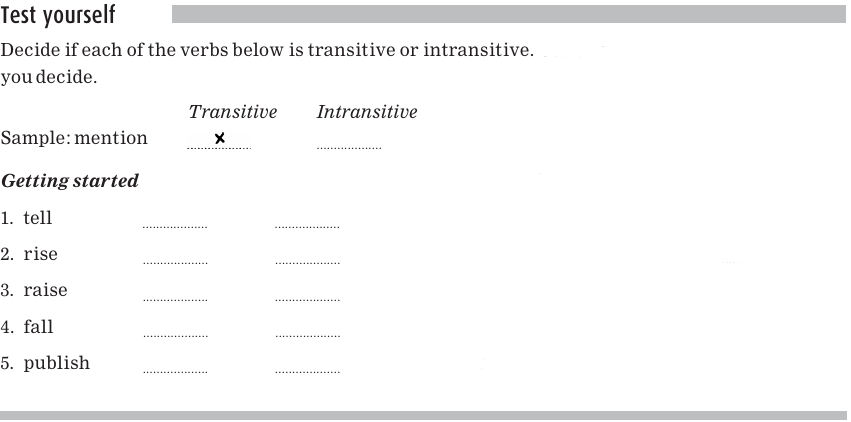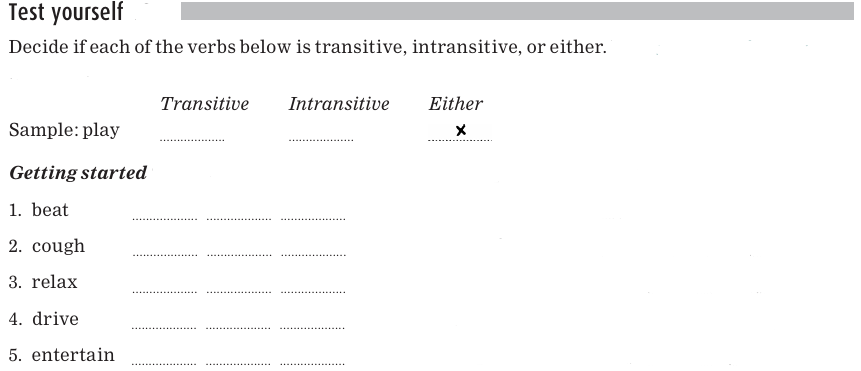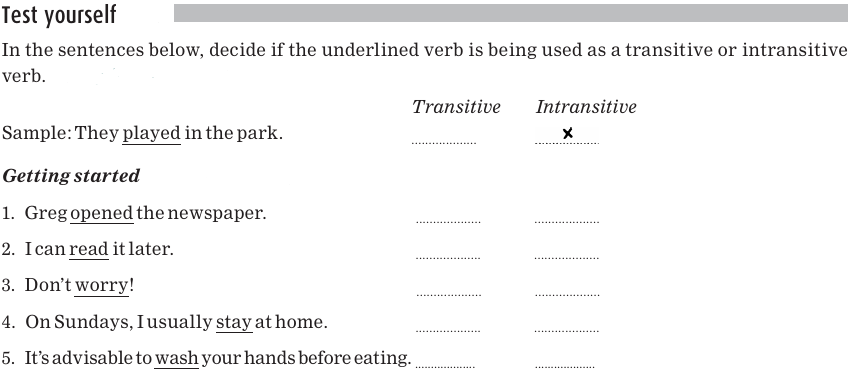

Grammar


Tenses


Present

Present Simple

Present Continuous

Present Perfect

Present Perfect Continuous


Past

Past Simple

Past Continuous

Past Perfect

Past Perfect Continuous


Future

Future Simple

Future Continuous

Future Perfect

Future Perfect Continuous


Parts Of Speech


Nouns

Countable and uncountable nouns

Verbal nouns

Singular and Plural nouns

Proper nouns

Nouns gender

Nouns definition

Concrete nouns

Abstract nouns

Common nouns

Collective nouns

Definition Of Nouns

Animate and Inanimate nouns

Nouns


Verbs

Stative and dynamic verbs

Finite and nonfinite verbs

To be verbs

Transitive and intransitive verbs

Auxiliary verbs

Modal verbs

Regular and irregular verbs

Action verbs

Verbs


Adverbs

Relative adverbs

Interrogative adverbs

Adverbs of time

Adverbs of place

Adverbs of reason

Adverbs of quantity

Adverbs of manner

Adverbs of frequency

Adverbs of affirmation

Adverbs


Adjectives

Quantitative adjective

Proper adjective

Possessive adjective

Numeral adjective

Interrogative adjective

Distributive adjective

Descriptive adjective

Demonstrative adjective


Pronouns

Subject pronoun

Relative pronoun

Reflexive pronoun

Reciprocal pronoun

Possessive pronoun

Personal pronoun

Interrogative pronoun

Indefinite pronoun

Emphatic pronoun

Distributive pronoun

Demonstrative pronoun

Pronouns


Pre Position


Preposition by function

Time preposition

Reason preposition

Possession preposition

Place preposition

Phrases preposition

Origin preposition

Measure preposition

Direction preposition

Contrast preposition

Agent preposition


Preposition by construction

Simple preposition

Phrase preposition

Double preposition

Compound preposition

prepositions


Conjunctions

Subordinating conjunction

Correlative conjunction

Coordinating conjunction

Conjunctive adverbs

conjunctions


Interjections

Express calling interjection

Phrases

Sentences


Grammar Rules

Passive and Active

Preference

Requests and offers

wishes

Be used to

Some and any

Could have done

Describing people

Giving advices

Possession

Comparative and superlative

Giving Reason

Making Suggestions

Apologizing

Forming questions

Since and for

Directions

Obligation

Adverbials

invitation

Articles

Imaginary condition

Zero conditional

First conditional

Second conditional

Third conditional

Reported speech

Demonstratives

Determiners

Direct and Indirect speech


Linguistics

Phonetics

Phonology

Linguistics fields

Syntax

Morphology

Semantics

pragmatics

History

Writing

Grammar

Phonetics and Phonology

Semiotics


Reading Comprehension

Elementary

Intermediate

Advanced


Teaching Methods

Teaching Strategies

Assessment
Transitive and intransitive verbs
المؤلف:
EVELYNP.ALTENBERG & ROBERTM.VAGO
المصدر:
English Grammar Understanding the basics
الجزء والصفحة:
P35-C2
2025-11-03
184
Transitive and intransitive verbs
Take a look at the following questions, each with an action verb.
1. What did you write?
2. Who did you annoy?
3. What did you throw?
These are all perfectly fine questions and easy to answer, e.g. I wrote a letter, I annoyed my neighbor, I threw a ball.
Now compare the first group of questions to the next group, each of which also has an action verb.
4. *What did you sleep?
5. *What did you die?
6. *Who did you arrive?
These questions are all strange and can’t really be answered. That’s because the verbs in this second group are verbs that do not act on anything.
Thus, you can see that there are two kinds of verbs. One kind, such as write, annoy, and throw, acts upon something. The noun (or noun phrase; see The basic structure of noun phrases) that the verb acts up on is called the direct object of the sentence. (You’ll learn more about direct objects in Direct objects.) Those verbs that act on something are called transitive verbs. Typically, in statements, a transitive verb is followed by the noun (or noun phrase) that it is acting upon.
Other verbs, such as sleep, die, and arrive, do not act upon something. In fact, these verbs can’t have a direct object. Notice that you can’t say, for example: *I usually sleep the dog, *They’ll arrive the book. Those verbs that do not act on something and appear in sentences that do not have a direct object are called intransitive verbs.
Quick tip
Action verbs that act upon something are called transitive verbs. Action verbs that do not act upon something are called intransitive verbs.
Quick tip
If a verb (in any of its forms) can be put in one of the followings lots, it is transitive: (a) What did you _______ ? (b) Who did you ______? If a verb cannot be put in one of these slots, it is intransitive.
So, which of the following verbs are transitive and which intransitive?
7. What did you discover?
8. *What did you struggle?
9. Who did you meet?
10. *What did you laugh?
Since sentences 7 and 9 are fine questions, discover and meet are transitive verbs. Since sentences 8 and 10 are not acceptable questions, struggle and laugh are intransitive verbs. Note
That although you can say something like, What did you struggle with? or, What did you laugh at?, you can’t ask the questions as they are stated above, and so the verbs are intransitive.
There’s also another way to decide if a verb is transitive or intransitive:
Quick tip
If a verb (in one of its forms) can be put in one of the following slots, it is transitive:
(a)He _________ something. (b)He ______ someone.
Quick tip
If a verb (in one of its forms) can be put in the following slot, it is intransitive: He ______.
Let’s use these Quick tips to decide which of the following verbs are transitive and which are intransitive:
11.He discovered something.
12.He met someone.
13.He struggled.
14.He laughed.
Quick tip helps identify the verb discovered in sentence 11 and the verb met in sentence 12 as transitive. Quick tip helps identify the verb struggled in sentence 13 and the verb laughed in sentence 14 as intransitive.

Answers

Now take a look at a few more sentences:
15a. I ate.
15b. I ate dinner.
16a. She dances well.
16b. She dances the tango well.
17a.Theaudienceleft.
17b.Theaudienceleftthetheater.
You can see that there are verbs, such as eat, dance, and leave, that can be used as either transitive or intransitive verbs.
Quick tip
Some verbs can be either transitive or transitive. These can occur in both of the following slots: (a) He ______ something/ someone. (b)He ______.

Answers


Answers

 الاكثر قراءة في Transitive and intransitive verbs
الاكثر قراءة في Transitive and intransitive verbs
 اخر الاخبار
اخر الاخبار
اخبار العتبة العباسية المقدسة

الآخبار الصحية















 قسم الشؤون الفكرية يصدر كتاباً يوثق تاريخ السدانة في العتبة العباسية المقدسة
قسم الشؤون الفكرية يصدر كتاباً يوثق تاريخ السدانة في العتبة العباسية المقدسة "المهمة".. إصدار قصصي يوثّق القصص الفائزة في مسابقة فتوى الدفاع المقدسة للقصة القصيرة
"المهمة".. إصدار قصصي يوثّق القصص الفائزة في مسابقة فتوى الدفاع المقدسة للقصة القصيرة (نوافذ).. إصدار أدبي يوثق القصص الفائزة في مسابقة الإمام العسكري (عليه السلام)
(نوافذ).. إصدار أدبي يوثق القصص الفائزة في مسابقة الإمام العسكري (عليه السلام)


















